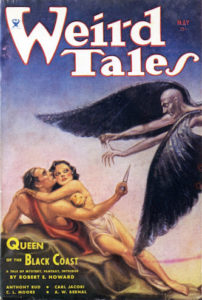Are indie authors the pulp fiction writers of the 21st century?
That question came to me in response to a comment JazzFeathers made on my May 2nd post about indie author TS Paul. She wrote that it seemed to her the indie movement is “a new incarnation of the pulp magazines”. I think she’s on the money.
Before I start, let me emphasize that as a reader I find that most authors, the vast majority of authors, are average. They tell a decent story and that’s about it. It doesn’t matter if the author is published by the Big 5, small press, or is self-published.
We readers, I think, operate under the delusion that the big corporate publishers publish only good books. However, that’s not so. Why? Because most authors in their catalogs are mid-listers. Which means the publisher is taking a gamble on them that they might, possibly, maybe make a buck for the publisher. Most don’t and the publisher is not shy about giving those authors the boot.
The big corporate publishers are ruthless. The bottom line is king. Money, money, money.
The pulp era was a golden age for readers and writers. The pulp magazines were cheap entertainment and they proliferated like mushrooms after a rain. And every wannabe writer rose to the challenge to provide the magazines with stories.
We remember the giants. The Lovecrafts, the Howards, the Blochs. We’ve forgotten such as Seabury Quinn, Donald Wandrei, Frank Gruber, Carl Jacobi, Manley Wade Wellman, and Mary Elizabeth Counselman. And the list of the forgotten would go on for far too many pages.
But we don’t even have to go back as far as the pulp era to find forgotten authors. Who today reads E.M. Delafield, or Shirley Jackson, Pearl S Buck, Patricia Highsmith, Margaret Millar, Jay Flynn, or Cornell Woolrich? None of them are bad. They’re just mostly forgotten.
Most writers are average; and, dare I say, mediocre? But that doesn’t mean they can’t deliver a decent and entertaining story. I still remember Stanton A. Coblentz’s Hidden World 45 years after reading it. I still remember Men, Martians, and Machines by Eric Frank Russell — a book I read in elementary school 50+ years ago. They still have a hold on my memory.
Today’s indie authors are the reincarnation of the pulp era writer. They write fast, publish often, and don’t care about perfection. Why not perfection? First, it doesn’t exist; second, it gets in the way of producing lots of decent work; and third, it gets in the way of making a buck. Indie authors are writing to make money. Just like Shakespeare. Although few authors anywhere reach the lofty heights of The Bard.
From a reader’s perspective, a writer’s being average isn’t bad. Those average writers produce the bulk of the fiction we read. If the book is decent, then we feel satisfied. I mean, how many movies or TV shows are stellar? Most are ho-hum to average. And a great many, let’s face it, suck.
As a reader, I love the indie revolution. I’ve discovered great writers out there. And I dare say not a single corporate publisher would have gambled on any of them. I’ve also discovered writers who didn’t inspire me and who I won’t buy anymore books from. The market does tend to weed out the chaff.
Conversely, I’ve gotten sick of being taken for a ride by the corporate giants. I won’t read anymore Lee Child. Uninspired and boring. The same for the Quiller novels. The first couple were okay. After that they’re all the same. I’m finished with Sara Paretsky, Marcia Muller, Cara Black, and Sue Grafton. They started out great and quickly went downhill. The books are simply too expensive for the little they deliver.
This is a great time to be a reader. I love it. There are so many good books out there. Many of them quite cheap, making for satisfyingly inexpensive entertainment.
Instead of TV or the movies, read a book with your family, spouse, partner, kids, or a friend. Books truly are the greatest thing since sliced bread.
Comments are always welcome, and, until next time, happy reading!
Oh, here is the link to Cinder — it is a #mustread!!
Share This!


